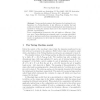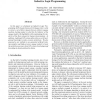198 search results - page 4 / 40 » Using Genetic Programming for Turing Machine Induction |
111
click to vote
PRICAI
2004
Springer
15 years 7 months ago
2004
Springer
Abstract. A successful case of applying brute-force search to functional programming automation is presented and compared with a conventional genetic programming method. From the i...
123
click to vote
EMO
2006
Springer
15 years 4 months ago
2006
Springer
Multi-objective metaheuristics have previously been applied to partial classification, where the objective is to produce simple, easy to understand rules that describe subsets of a...
96
Voted
MST
2002
15 years 1 months ago
2002
Programmed mutagenesis is a DNA computing system that uses cycles of DNA annealing, ligation, and polymerization to implement programatic rewriting of DNA sequences. We report that...
141
click to vote
SOFSEM
2012
Springer
13 years 10 months ago
2012
Springer
Abstract. Various methods exists in the literature for denoting the configuration of a Turing Machine. A key difference is whether the head position is indicated by some integer ...
119
click to vote
ICTAI
2007
IEEE
15 years 8 months ago
2007
IEEE
In this paper we developed an Inductive Logic Programming (ILP) based framework ExOpaque that is able to extract a set of Horn clauses from an arbitrary opaque machine learning mo...


